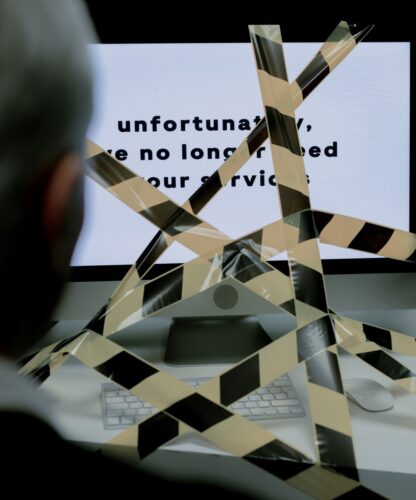'Been There Dump That' Emotional Hurt Mentality Can Be Overcome
Fear of rejection is a universal feeling, and everyone has had that “been there dump that” emotion at some time in their life, regardless of their age, gender, ability, or nationality. It’s quite normal to feel emotional hurt from feeling rejection, whether it is romantic, platonic, or professional.

For me, learning stoicism has been useful when it comes to handling fear and all emotions, the emotions that come with concerns over being accepted in the various relationships you may have in life. My belief is that once you’re equipped with the right knowledge you can handle anything, because nothing can stop you except yourself. Remember, knowledge is power.
Fear of rejection can be difficult for anyone to handle, but for individuals on the spectrum or for ones who struggle with autism low self-esteem, it can be especially challenging. Whether it concerns potential romantic relationships, budding friendships, or professional or work settings, the possibility of rejection can cause significant anxiety and distress.
Navigating the nuances of dating, making small talk, or workplace politics often requires an intuitive understanding of unspoken social cues and norms that people with autism struggle to pick up on.
However, by utilizing supportive resources, openly communicating needs, and reframing negative thought patterns, neurotypical and neurodiverse individuals alike can find relief and belonging.
Been There Dump That: Coping with Romantic Rejection
Romantic relationships can already feel intimidating for many people with autism. Finding the confidence to approach potential partners requires bravery. Reading flirtatious signals accurately also proves tricky when unable to interpret body language, facial expressions, or tone properly.
Fear of rejection often stems from these misread verbal and nonverbal cues from the other person. If they then directly reject a date invitation or end a budding relationship with a “been there dumped that” attitude, it cuts especially deep.
Rather than projecting assumed intentions however, directly asking the person questions like, “Would you like to go out sometime?” or “How do you feel about me?” can clarify the ambiguity. That reduces anxiety over making an unwanted advance. If still turned down after that, it likely reflects compatibility issues rather than a personal flaw. Easier said than done of course!
But reflecting on qualities you genuinely want in a caring, understanding partner helps raise relationship standards.
Expanding social circles also plays a role in meeting potential partners who share common interests. Joining autism support groups and putting oneself out there takes courage, but a little flirting practice amongst friends first eases the pressure.
And engaging in enjoyable hobbies in groups, like book clubs, gaming clubs, or hobby meetings, makes socializing less intimidating. Patience plays a key role too in developing any romantic connection.
Appreciate stepping stones along the way rather than expecting instant chemistry.
Then if rejection still occurs, it feels less jarring in context of emotional hurt due to that gradual process.
RELATED: Love Without Limits – Navigating Romance and Dating with Autism
Managing Autism and Fear of Rejection from Friends
Making and keeping friends can prove just as emotionally frustrating. People with autism often yearn for deeper social connections yet struggle blending into casual peer groups. Simplistic small talk feels shallow rather than a bridge to more meaningful dialogue.

If repeatedly left out of social gatherings with peers it inevitably breeds resentfulness and lowered self-esteem. Feelings of not being “good enough” permeate. Rather than withdrawing inward however, joining autism community support groups helps in establishing acceptance and belonging.
People who face similar day-to-day challenges provide a safe sounding board. And just being at ease in a welcoming space with those like yourself eases social anxiety.
From there, gradual exposure therapy helps in befriending neurotypicals. Setting small achievable social goals, like a weekly coffee chat or game night, makes regularly practicing casual conversation less overwhelming. Building on successes, even minor ones, motivates bigger steps.
Eventually, organically connecting with just a few genuinely caring friends outweighs having many superficial social ties. It simply takes patience, courage and refusing to give up because emotional hurt and fear of rejection feels temporary rather than permanent.
RELATED: Autism Social Skills – Inferencing and Body Language Hurdles to Overcome
Coping with Workplace Rejection

Candidates on the spectrum may have abundant technical qualifications but falter detailing them confidently face-to-face. Stilted responses to common interview questions also raise red flags over fitting organizational culture.
As with dating, directly asking clarifying questions helps too in interviews. If unsure what the employer means by “team player” or “self-motivated” for example, requesting additional detail eases confusion.
Disclosing one’s autism diagnosis also remains an individual choice. It should not legally impact hiring decisions, but does offer context if needing particular accommodations.
RELATED: Autism Disclosure – Is Revealing Your Disorder Helpful or Hurtful?
Upon being hired, don’t immediately view smaller oversights as rejection. Co-workers forgetting to copy you on emails or not inviting lunch may stem from oversight rather than exclusion. Volunteer piped up input during meetings and showing interest in colleagues’ work projects helps embed your presence.
Over several months, earning industry certifications, joining workplace committees and winning over leadership through strong performance does help in shifting colleague perceptions.
If you still suspect bullying or discrimination later on however, consulting a manager, human resources or labor regulatory agency ensures addressing the situation properly. But refrain from dire warnings that “nobody likes me here” since misreading cues does happen.
Also, resist the notion of been there dump that in terms of switching jobs because you don’t think you fit in. Give it time.
Some colleagues may need educating on making simple autism accommodations like quiet workspaces, written meeting recaps or advanced deadlines. Framing it as enriching the team dynamic eases any imposition feelings and fear of rejection.
RELATED: Why Labeling People Can Lead to Stereotyping and Discrimination
Self-Care Strategies to Help with Emotional Hurt and Fear of Rejection
While educating people unfamiliar with autism does help avoid misconceptions, their lingering rejection still causes emotional hurt and autism low self-esteem at times. Practicing regular self-care, like journaling, exercising, pursuing creative hobbies or chatting with trusted friends maintains some emotional equilibrium when tensions escalate.
Indulge in comfort foods or funny movies too in moderation. The support of loved ones who reinforce self-worth with encouragement also prevents spiraling too deeply down the rabbit hole of despair when social setbacks strike.
Not everyone encountered in life will intuitively “get” autism despite spreading awareness. But prioritizing 4 or 5 genuine friendships feels far more rewarding than 100 superficial ones anyway. Seek out those who appreciate you rather than pine for those predisposed not to.
And regarding romance or career, adopting a growth mindset focused on continual development aids progress too when working on overcoming fear of rejection in life. After all, nobody, and I mean NOBODY, masters dating, social finesse or workplace politics overnight.
Before adopting a been there dumped that approach to trying to fit in or develop relationships, remember that concession makes peace with the notion that rewarding human connections require working through periods of uncomfortable vulnerability in order to evolve.
RELATED: The Fascinating Explanation of Spoon Theory Mental Health
Coping with Fear of Rejection and Becoming More Confident
Rejection undeniably stings, maybe a little more so for those with autism. But continuing to put oneself out there socially and professionally, despite mistakes or hiccups, makes positive strides long term.
Reframing thought patterns to be more self-forgiving also lessens feelings of failure when other people’s actions feel unimportant. You cannot control other’s perceptions fully. But focusing efforts on the aspects of relating you can improve reveals slow small signs of progress in overcome fear of rejection and emotional hurt in time.
That may translate to more assured flirting capabilities, deeper social bonds or career advancement if patient. Not everybody encountered will empathize with an autism condition, but the select few who genuinely do make all the difference in building confidence.
Surround yourself with those supportive faces. And occasionally revisit past journal entries tracking growth through various friendship or workplace milestones. Concrete evidence of progress sustains motivation on especially discouraging days when you have felt rejected. You’ve likely come further than it feels presently.
RELATED: Break Free From These 7 Unhealthy Coping Mechanisms
Practical Tips for Building Confidence
Facing potential rejection across all spheres of life—dating, friends, career—can definitely feel intimidating for someone with autism. But there are practical strategies to help build confidence and resilience when putting yourself out there and overcoming autism and fear of fitting in.

These baby steps won’t all lead to love connections but do reinforce social capacities in low-pressure environments.
When ready to then ask someone out who truly sparks your interest, don’t hesitate long. Be politely direct in order to avoid misreading signs. If they decline the date, it likely just indicates incompatible lifestyles or values rather than anything being “wrong” with you. Rejection stings but it’s not a reflection of your worth or potential. Every “no” simply gets you closer to the right “yes.”
At the same time, don’t rush over and ask a person out before practicing some basic etiquette rules like learning a person’s name and interests. While you don’t want to drill a person with incessant questions, asking out someone before you even have a basic conversation is likely to end up with a no-go.
In friendship, opt for quality company over quantity. Having just a few friends who share your offbeat interests or humor is far more rewarding than superficial small talk with large groups. You don’t have to become the life of every party.
But regularly scheduling game nights, nature walks or movie screenings with those few trusted confidants guarantees meaningful support.
When feeling isolated, also lean on online autism communities who provide judgment-free sounding boards 24/7.
Lastly for career advancement, play to your strengths unapologetically. People with autism tend to excel at concrete skills like programming, data analysis, writing, graphic design etc. So develop impressive portfolios around those talents rather than forcing yourself into roles necessitating smooth talking.
Many jobs today prioritize demonstrable competencies over being social butterflies.
When interviewing, thoroughly research the company’s vision statement and objectives rather than generic prep questions. Then explain precisely how your expertise suits those business needs. This shows strategic alignment beyond just needing a paycheck.
Once on board, volunteer for isolated special projects to further display your focus. Success feels less dependent on charming coworkers if spotlighting specialized contributions.
Remember progress over emotional hurt happens gradually. Reframe fear of rejection and possible outright disses as redirection rather than failure. Not every environment appreciates autistic tendencies but those which do facilitate incredible impact.
Surround yourself with supportive communities and partners. Comparison creates misery—run your own race. No one masters confident vulnerability immediately. But continually saying “yes” to small steps leads towards greatness in all facets of life.
RELATED: 8 Popular Ways to Manage and Master Autistic Social Awkwardness
Don’t Forget to Show Your True Self and Remember Grace
For anyone on the spectrum, remember that social awkwardness or interview anxiety does not reflect your self-worth or potential. These are skills developing over a lifetime, not personality flaws. Be compassionate with yourself when facing rejection or perceived failure.
Sometimes its okay to be the one who has been there dumped that, because it has helped you grow and learn.
And continue daring to put yourself out there socially, romantically and professionally. Connections and opportunities manifest through repeatedly showing up authentically. The right people and situations aligned to your needs eventually appear!
Just brace through the discomfort now knowing that rejection rarely reflects permanent realities and emotional hurt. This too shall pass.
If you liked this blog, here are others you might enjoy as well.
Autism in Adults: Living, Learning, and Overcoming Challenges for a Fulfilled Life
Autism in adults requires additional support and coping skills to achieve independence in today’s world. Learn more about ways adults can live fulfilled lives and the challenges they face.
- Autism and Independence: 7 Skills That Empower Individuals to Thrive
- Dangers of Social Media Addiction: How To Leave the Screens And Face the Real World
- Autism Volunteer Opportunities: 5 Ways Helping Others Fosters Acceptance
- 8 Heartfelt Ways Autism Emotional Support Animals Transform Lives
- Autism in the Future: Optimism for Improved Perception and Embracement
- Autism and AI: 7 Discoveries About the Surprise Pairing and Profound Impact
- Are You An Adult With Autism? Here Are 6 Signs
- Autism After High School: Is College the Next Step?
- Autism vs Asperger’s Syndrome: What You Need to Know
- Autism Disclosure: Is Revealing Your Disorder Helpful or Hurtful?
- Work and Autism: What Employers Should Know About Hiring People Like Me
- Drivers with Autism Can Achieve Success Behind the Wheel